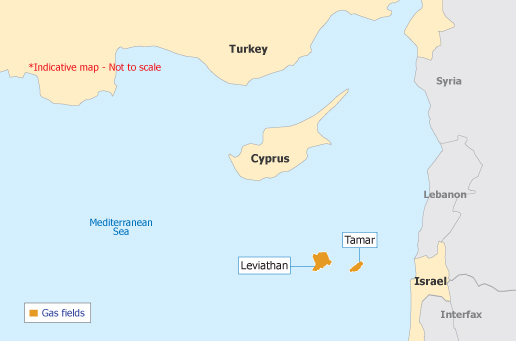Russia closes in as Woodside Leviathan deal looks shaky
DATE:2014-01-06 | comments: | posted by:liuailin

Russia closes in as Woodside Leviathan deal looks shaky.
Russia is moving in on opportunities to invest in the East Mediterranean offshore gas industry at a time when uncertainty clouds the deal for Australia’s Woodside to take a 30% stake in the Leviathan field – Israel’s largest gas discovery.
Two weeks after Tel Aviv and Moscow signed an MOU opening up the prospect of Russian investment in Israel’s upstream gas sector – with Novatek the likely forerunner for any deal – Russia’s Soyuzneftegaz signed an agreement with Syria’s state-owned General Petroleum Corp. to explore for oil and gas in Syrian waters (see MOU may clear way for Russian investment in Israel upstream, 10 December 2013).
The Russian company will finance the 25-year exploration programme, and recover costs if hydrocarbons are found, al-Monitor reported.
Soyuzneftegaz “will start implementing the deal immediately, bypassing the unfair economic sanctions against the oil sector”, the website reported Syrian Oil Minister Suleiman al-Abbas – who signed the contract on behalf of the Syrian government – as saying.
Nick Butler, chair of the Kings Policy Institute at Kings College London, hailed Russia’s agreement with Syria as a potential game changer for the region. “In the absence of a viable [export] alternative, all the parties involved [in the East Mediterranean] might settle for allowing Russian companies to manage the development process across the basin,” he wrote in the FT on 30 December.
Russia has good political relations with Cyprus and Israel as well as Syria, and “could easily override any disputes between Cyprus and Turkey” which could hinder the development of regional pipelines, he argued.
Woodside Chief Executive Peter Coleman said in December that the company’s future in Israel would be clarified in 2014. However, he stressed the project would have to deliver clear value to justify the estimated $8 billion in development costs (see Woodside’s LNG price negotiations heating up, 10 December 2014).
“We’re not in it just to do a deal. We have other options that we’re also pursuing, and in this case we’re ensuring that whatever we do – if we do enter into this joint venture – it’s done in a way that offers a commercially sensible outcome for all of us,” he said.
There has been growing uncertainty over the deal since the company announced is $1.25 billion farm-in agreement a year ago. Not only did the Israeli government deliver its gas export policy around six months later than developers had planned, but at 40% the final export cap was higher than initially anticipated.
During 2013, the prospect of developing a network of regional pipelines – limiting the scale of any future LNG project – has emerged as the preferred option for monetising Leviathan gas, casting Woodside’s role in the project as an experienced onshore LNG developer into doubt.
However, both parties are still interested in clinching a deal. Woodside has agreed to raise the price it will pay for the 30% stake in Leviathan to reflect an increase in the field’s resource estimates from 453 to 538 billion cubic metres, according to Israeli business daily Globes.
Delek Energy, which holds a 45% stake in Leviathan, confirmed on Thursday that “the parties are negotiating continuously in order to sign a binding agreement for the sale of rights [in the Leviathan project]”.
Anti-trust negotiations
However, the partners cannot start negotiating domestic supply contracts from the Leviathan field, or close the 30% farm-in deal with Woodside and start negotiating export contracts, until Israel’s anti-trust authority rules on whether the Leviathan and Tamar gas fields – both held by Noble and Delek – constitute a monopoly.
Rather than restricting the partners’ gas sales from the Leviathan field, it is likely Noble and Delek will be forced to sell their stakes in the Tanin and Karih gas fields, also offshore Israel. However, it is not certain whether this will become a binding agreement, Delek said on Wednesday.
Hot Products
- Building Type Gas Regulator Box with doub
- Multipled gas regulator box/Regulator box
- Gas regulator for mesolow boiler/ Gas val
- Double lines gas regulator for boiler
- RTZ- ※/0.4A Series Direct-operated Gas
- RTJ-※/0.8GK Series Pressure Reducing Re
- RTJ- ※/0.4FK Series Self-operated Gas P
- RTZ-GQ Series Gas Pressure Regulator
- RTJ-SQ Series Gas Pressure Regulator
- RTZ-※/0.6 Type High-pressure Pipeline L
Hot Document
- What Is a Gas Regulator?
- How to Adjust a Gas Regulator
- How to Test a Fuel Injection Pressure Reg
- Gas Pressure Regulator Definition and Ope
- How Does a Natural Gas Pressure Regulator
- Compressed natural gas
- Pressure Regulators: Operation and Handli
- Compressed Gas Pressure Regulators
- How a Natural Gas Regulator Works?
- How Does a Natural Gas Regulator Work?
Hot news
- CMR gas pressure regulator for dual-fuel
- Chinese Gas Pressure Reducing System Indu
- Oil and gas regulator chairman makes frac
- Gas Pressure Regulator Failure and Buildi
- CPC hopes for pipeline connection to Chin
- Dutch Gate LNG marks four months of reloa
- Ghana still waiting for gas-fired growth
- China’s SOE and gas price reforms pick
- DOE considers government control over LNG
- Angola LNG leases another tanker
